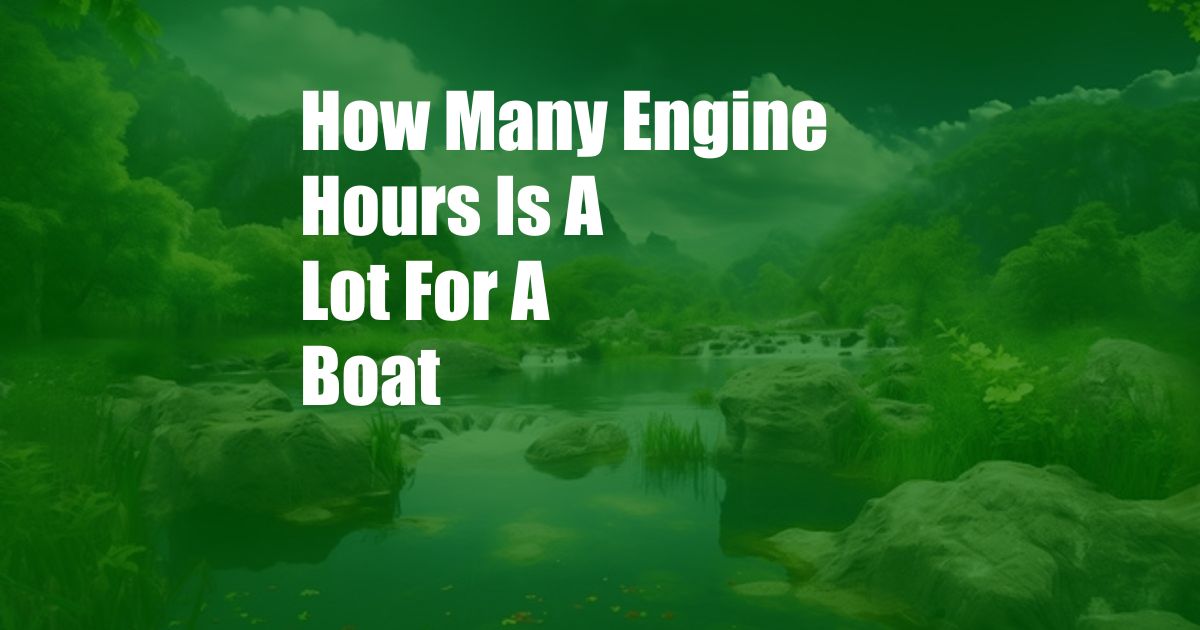
How Many Engine Hours is a Lot for a Boat?
As a passionate mariner, I’ve witnessed firsthand the thrill of navigating the boundless expanse of the ocean. Every vessel has a unique story to tell, embedded within the hum of its engine. But amidst the excitement, a question lingers: how many engine hours is a lot for a boat?
The answer, like the ocean itself, is not straightforward. Factors such as engine type, maintenance history, and operating conditions influence the lifespan of a marine engine. However, understanding the complexities of engine hours can help you make informed decisions when purchasing or owning a boat.
Engine Hours: A Measure of Time or Wear?
Engine hours, measured through a tachometer, indicate the accumulated time an engine has been in operation. However, they are not a direct measure of wear and tear. Regular maintenance and proper operating practices can extend engine life, while neglect and abuse can shorten it.
Considering Engine Type
Different engine types have varying lifespans. Inboard gasoline engines typically last around 1,500-2,500 hours, while diesel engines can reach 3,000-5,000 hours. Outboard engines, designed for smaller boats, have an average lifespan of 1,000-2,000 hours.
The Impact of Maintenance
Regular maintenance is crucial for extending engine life. Oil changes, impeller replacements, and tune-ups should be performed according to the manufacturer’s recommendations. Proper winterization and storage can also prevent costly repairs.
Operating Conditions Matter
High-load operations, such as towing or water skiing, put additional stress on the engine. Operating in saltwater environments accelerates corrosion. Conversely, freshwater use and moderate loads can contribute to a longer engine life.
Determining High Engine Hours
Generally, engine hours below 1,000 are considered low. For diesel engines, 2,000-3,000 hours is moderate, while over 4,000 hours is considered high. For gasoline and outboard engines, 500-1,000 hours is moderate, and over 1,500 hours is considered high.
However, these estimates are not set in stone. A well-maintained engine with low hours may outlast a neglected engine with high hours. It’s always advisable to hire a qualified marine surveyor for a thorough inspection before making any purchasing decisions.
Tips and Expert Advice
- Regular Maintenance: Stick to the manufacturer’s maintenance schedule to prevent premature wear.
- Use High-Quality Fuel: Proper fuel can minimize carbon deposits and prolong engine life.
- Operate Responsibly: Avoid overloading or over-revving the engine.
- Check Engine Oil Regularly: Monitor oil levels and color to detect any signs of contamination.
- Get a Professional Inspection: A qualified marine surveyor can assess the overall condition of the engine and advise on its remaining lifespan.
By following these tips, you can maximize the lifespan of your boat’s engine and enjoy countless hours of nautical adventures.
FAQs
- Q: How often should I change the engine oil?
A: Refer to the manufacturer’s recommendations, typically every 100-200 hours of operation. - Q: Is it okay to leave my boat engine running while I’m not on board?
A: No, always turn off the engine when unattended. - Q: How can I estimate the remaining lifespan of my boat’s engine?
A: Consider the engine type, maintenance history, operating conditions, and a professional inspection. - Q: What are the warning signs of a failing engine?
A: Excessive smoke, knocking sounds, overheating, and oil leaks are potential indicators.
Conclusion
Understanding how many engine hours is a lot for a boat is essential for making informed decisions about purchasing and owning a vessel. While engine hours are a factor to consider, they should not be the sole determinant of a boat’s value or lifespan. Regular maintenance, proper operating practices, and a professional inspection can extend the engine’s life and ensure countless hours of boating enjoyment.
Are you interested to know more about boat engine hours or have any further questions? Don’t hesitate to reach out for additional insights and guidance.